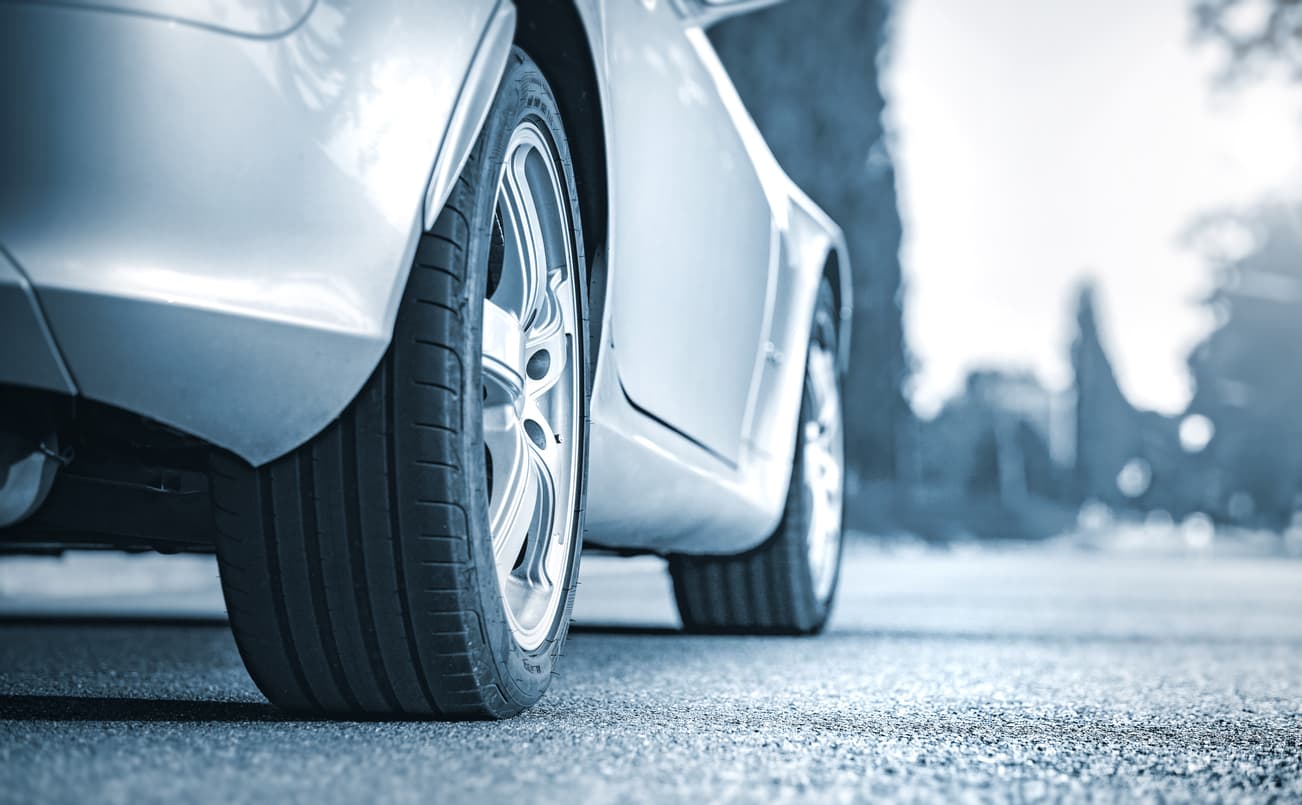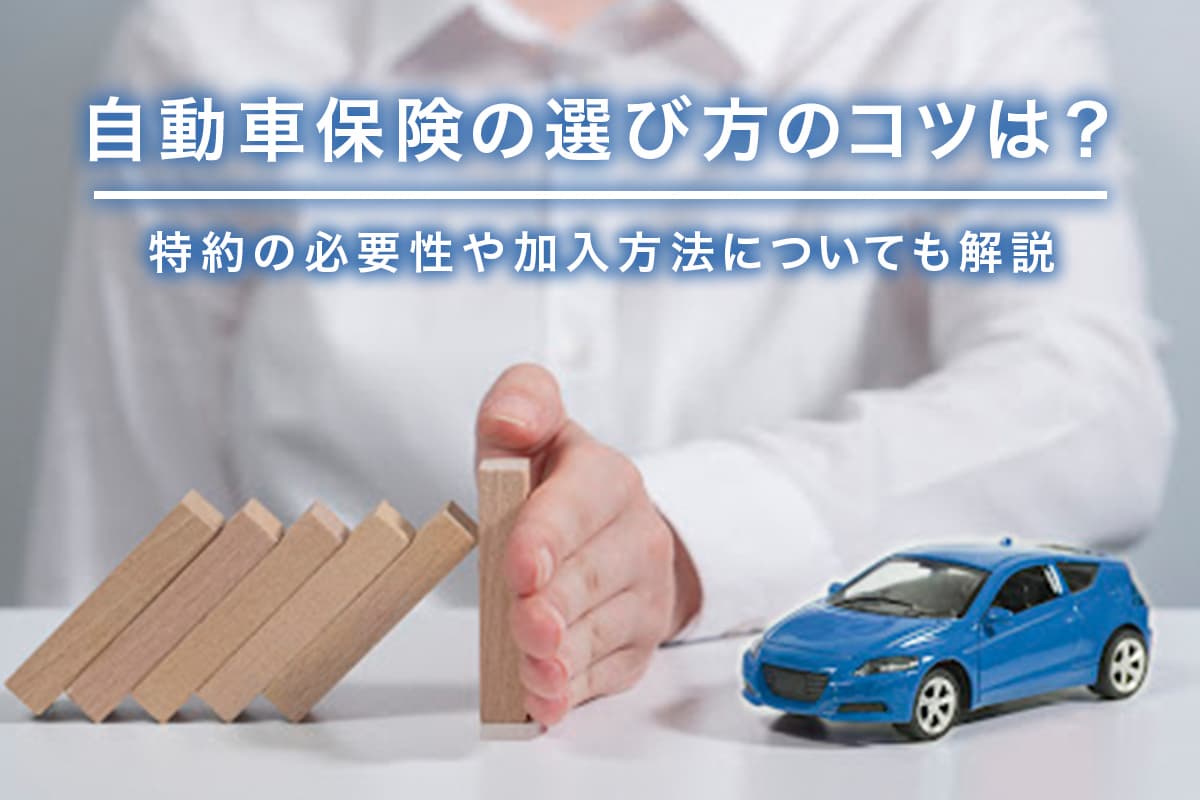Even if you drive safely, if you get into a car accident, you will be forced to incur considerable expenses in compensation and injuries.
In order to prepare for such an eventuality, it is essential to subscribe to car insurance. However, there are countless insurance companies that offer car insurance, and even within a single insurance company, there are a wide variety of insurance policies.
Even if you think at first glance that you don't need certain coverage or special provisions, you may realize their necessity once you understand the outline. Let's understand not only the low premiums but also the importance of support.
In this article, we will explain how to choose the most suitable insurance based on your needs from among the many and complicated insurance options. We will also explain how to apply for insurance, so please read this article if you are considering applying for insurance.
目次
- Why you need car insurance
- Before you buy car insurance, get your objectives in order
- Seven basic coverages in car insurance
- 4 things to consider when choosing an auto insurance company
- Insurance premiums and discounts
- Special contracts and road service availability
- Accident response system
- Insurance company reviews and reputation
- Two ways to get car insurance
- Agency type through an agency
- Direct contracts made over the internet or telephone
- Frequently asked questions about choosing car insurance
- Do I need vehicle insurance?
- Are there any tips to reduce car insurance premiums?
- What are the grades related to car insurance premiums?
- Get the right car insurance for your needs
Why you need car insurance

There are two types of automobile insurance: automobile liability insurance (compulsory automobile liability insurance), which all drivers are required to have, and voluntary insurance, which is up to each individual driver.
You may think, "If the compulsory automobile liability insurance that I am required to join covers the minimum, then I don't need optional insurance, right?" However, before making that judgment, you need to know the scope of compulsory automobile liability insurance.
This is because the coverage of compulsory automobile liability insurance is limited to bodily injury compensation. Compulsory automobile liability insurance is insurance to compensate for damages caused to the other party in the event of an accident, and does not cover the other party's car or your own injuries.
For example, if a salaried worker who does not have voluntary insurance is injured in a single-car accident and is unable to work, he or she will not receive any compensation from compulsory automobile liability insurance. With no medical expenses or replacement wages for the time he or she is unable to work, the worker may find themselves in a financially difficult situation.
Voluntary insurance can cover such situations depending on the coverage. If you want to secure the "minimum" necessary for the unlikely event of an accident, you should understand that compulsory insurance cannot cover it all.
Before you buy car insurance, get your objectives in order

Voluntary insurance not only includes minimum coverage, but car insurance also includes vehicle insurance and special provisions, which vary depending on the purpose.
For example, the Family Bike Special Clause, which is a special clause for mopeds, is useful for people who have the opportunity to drive mopeds as well as regular cars, but for people who do not ride mopeds, it is not a special clause that is of much benefit and they end up paying extra insurance premiums.
To avoid situations such as "not being able to receive the necessary compensation because you don't have special clauses" or "wasting money on insurance premiums because you have added unnecessary clauses," it is important to clarify the purpose of taking out car insurance.
Seven basic coverages in car insurance

Most car insurance policies include the following seven basic coverage items:
[Liability insurance]
| Insurance Name | Scope of compensation | Compensation details |
| Personal injury insurance | Other people involved in the accident | The amount that exceeds the amount of insurance provided by the compulsory automobile liability insurance |
| Property damage insurance | Property such as cars, houses, possessions, etc. | Applies when legally liable for damages
Compensation for indirect damages in addition to direct damages from accidents |
[Insurance]
| Insurance Name | Scope of compensation | Compensation details |
| Personal Injury Compensation Insurance | Named insured persons and their spouses, relatives living together, unmarried children living separately, passengers in cars under contract, etc. | Applies when the subject is killed or injured, regardless of the degree of negligence
The compensation limit can be selected from 30 million yen, 50 million yen, 100 million yen, unlimited, etc. |
| Passenger Accident Insurance | All passengers on board | Pre-determined insurance amount |
| Self-inflicted accident insurance | All passengers on board | Death: 15 million yen
Permanent disability: 500,000 to 20 million yen *Personal injury insurance is given priority |
| Uninsured Motorist Accident Insurance | Named insured person and their spouse, relatives living together, unmarried children living separately, passengers, etc. | Applies to cases where the other party in an accident is an uninsured vehicle, where the conditions are not met even if the insured vehicle is insured, or in the case of a hit-and-run accident. |
[Vehicle Insurance]
| Insurance Name | Scope of compensation | Compensation details |
| Vehicle Insurance | The car specified at the time of contract | Single vehicle accidents, flying stones, natural disasters, theft, etc. |
Of these, bodily injury liability insurance and property damage liability insurance generally have unlimited coverage amounts, as the amount of compensation is likely to be huge.
Also, depending on the needs of the person looking to buy insurance, there may be some insurance that is unnecessary. A typical example is buying car insurance when you are about to change your vehicle.
4 things to consider when choosing an auto insurance company

Although it is important to prepare for the worst case scenario, pouring endless amounts of money into insurance is an unbalanced choice. However, focusing only on low premiums and neglecting the essential coverage would be putting the cart before the horse.
When choosing insurance that suits your needs, the basic coverage is often similar, so it may be difficult to know what to compare in that regard.
Here are some things to keep in mind when choosing a car insurance company.
- Insurance premiums and discounts
- Special contracts and road service availability
- Accident response system
- Insurance company reviews and reputation
Using the above four criteria as a guide, compare insurance companies and insurance plans that suit your needs.
Insurance premiums and discounts
Since car insurance is basically a pay-as-you-go insurance (there is no maturity benefit and no cancellation refund even if you cancel the policy midway), keeping premiums down is a very important factor when choosing insurance.
Of course, you can simply compare insurance premiums, but some insurance companies offer discounts if you meet certain requirements. For example, there are internet discounts available for completing procedures online, discounts for driving an eco-car, and discounts for having a gold driver's license.
Compare multiple insurance companies and insurance plans to choose one that offers services that meet your needs and premiums that you are happy with.
Special contracts and road service availability
The basic coverage such as bodily injury liability, property damage liability, personal injury, and vehicle insurance is similar among insurance companies, but the accompanying special clauses and services show great individuality.
Typical additional clauses and services include legal fees in the event of a problem, road service in the event of an accident, and emergency response services, but the availability of these, the details of what they include, and the conditions of application vary greatly depending on the insurance company and insurance plan, so it is important to choose what you need.
Example of special provisions
In addition to the basic coverage, special clauses provide additional support in the unlikely event of an accident. Typical special clauses include the following:
| Special Terms | Compensation details |
| Attorney's Fees Compensation Special Clause | Special clause to cover costs such as negotiations through lawyers |
| Rental car expenses special clause | A special clause that covers the cost of using a loaner car while your car damaged in an accident is being repaired |
| Family Bike Special | Special clause to cover bodily injury, property damage and personal injury while driving a moped |
Adding special clauses will result in you paying more insurance premiums, but you will not be able to receive any support once an accident occurs.
In particular, you need to carefully consider whether or not you need legal fees. In the case of a personal injury accident, you may have to negotiate for a settlement, but it can be very difficult to complete this completely on your own.
The special clause may apply not only to the contract holder, but also to family members and other relatives. Since overlapping special clauses can lead to paying extra costs, we recommend that you check the various insurance policies you currently have and also check with your family when applying for car insurance.
An example of road service
By subscribing to road service, you can receive support in the event of an accident or vehicle trouble, but if you have never had an accident, it may be difficult to imagine what kind of service you can actually receive.
Examples of the support you can receive through road service include:
- Towing in case of car breakdown
- Spare tire replacement in case of puncture
- What to do when you run out of gas or your battery is dead
- Support for car breakdowns while traveling, etc.
If you spend a lot of time driving or travel long distances, consider how much support you need.
Accident response system
If you have an accident, you may panic and not know what to do or where to start. If you are unable to get proper assistance from an insurance company in such a situation, there is little merit in joining the company.
You should also compare the accident response details, such as whether they will respond 24 hours a day, 365 days a year, whether they will provide assistance with the cost of returning home from the scene of the accident, and whether they will provide a rental car.
Polite and prompt support is essential for a safe accident response. Avoid companies with poor reviews for satisfaction with accident response, and check the customer reviews to determine the response capabilities of companies that interest you.
Insurance company reviews and reputation
Even if you look at the details of compensation and support in a catalog, pamphlet, or on the Internet, you cannot know the quality until an accident or trouble actually occurs. If you decide on insurance without feeling satisfied, you will inevitably continue to feel anxious.
When choosing insurance, one option is to check social media and review sites as a reference point. You can get an idea of the response capabilities and support offered by insurance companies from the real opinions of people who have actually signed up for the insurance.
You also want to avoid companies that are reluctant to pay your insurance premiums if you have an accident. It's also a good idea to look for information on whether insurance premium payment assessments are strict by reading user testimonials.
While reviews are often anonymous, and you can hear the real voices of people, they also lack credibility. Companies that have actually received a lot of complaints can be found in the statistics compiled by the General Insurance Association of Japan.
One way to consider whether you can trust word of mouth and reputation is to compare it with the actual number of complaints.
Two ways to get car insurance

Once you have decided on the car insurance you want to sign up for, you can go ahead and apply for it.
There are two ways to join: through an agency, where you meet with a staff member in person, and through a direct system that can be completed over the internet or telephone, so it's important to choose the one that suits you.
Agency type through an agency
Insurance purchased through an insurance agency is called agency-type car insurance. The advantages and disadvantages are as follows:
| Merit | Demerit |
|
|
This method of procedure can make it easier to proceed with the procedure through detailed consultations and can give you a sense of security, but if the person in charge does not understand your needs well, you may be recommended unnecessary special clauses or support.
Taking the above characteristics into consideration, agency-type car insurance is suitable for the following people:
- People who value the peace of mind of face-to-face meetings
- People who want more thorough support for procedures
- People who want to think about the insurance they need through consultation
Since the quality of the staff is important, we recommend that you choose not only the insurance company but also the agency based on word of mouth and reputation.
Direct contracts made over the internet or telephone
Insurance that you contract directly with an insurance company via the Internet or telephone is called direct car insurance. Because of its nature, it is sometimes called "mail order type."
The advantages and disadvantages of the direct approach are as follows:
| Merit | Demerit |
|
|
It is possible to reduce the hassle and cost of the procedure, and if you have knowledge of insurance, you can proceed with the procedure more smoothly. On the other hand, the ease of consultation and the sense of security of face-to-face contact may feel less than with an agency type.
Therefore, direct insurance is suitable for people who have the following needs:
- People who want to reduce insurance premiums
- People who want to avoid the trouble of visiting a store
- People who can research insurance themselves
Direct-type car insurance tends to provide comprehensive support for procedures other than face-to-face meetings.
Frequently asked questions about choosing car insurance

Many people take out voluntary automobile insurance because compulsory automobile liability insurance alone does not provide enough support, but many people have questions about it due to its complexity.
Be aware of common questions and their answers in advance to reduce the stress of choosing insurance.
Do I need vehicle insurance?
Basically, it is better to have it to give you peace of mind. Vehicle insurance is insurance that provides peace of mind when you continue to drive the vehicle in question.
This is especially recommended for people who frequently use their car for work or commuting, people who are attached to their car, and people who have purchased a car on loan.
On the other hand, this insurance is not suitable for people who plan to change their car immediately or who are okay with scrapping their car in the event of an accident.
Also, be aware that there are some categories of vehicles that are difficult to get insurance for. Older cars, luxury cars, and sports cars have higher repair costs and frequency, so it is more difficult to get insurance for them than regular cars.
Are there any tips to reduce car insurance premiums?
It is important to narrow down the coverage and special provisions. Regularly reviewing your insurance coverage after signing the contract can also help you save money.
When choosing and processing your insurance, keep the following points in mind:
- Vehicle insurance coverage
- Eliminate and review overlapping special provisions
- Setting and reviewing the scope of coverage, such as for yourself only or for couples only
- Availability of discounts
- Combining with life insurance
What are the grades related to car insurance premiums?
Drivers are assigned a grade based on their accident history and whether or not they have previous contracts, and insurance premiums are discounted depending on the grade.
Basically, the fewer accidents you have, the higher your grade will be and the lower your insurance premiums will be. Similarly, the more accidents you have, the lower your grade will be and the higher your insurance premiums will be. Your insurance company will explain your grade when you have an accident, so it will not change without your knowledge.
All insurance companies use a rating system, and your rating will be carried over even if you change insurance companies. To save on insurance premiums, be sure to drive safely.
Get the right car insurance for your needs

Since compulsory automobile liability insurance alone can leave you feeling unsure about coverage, we recommend that you also enroll in optional automobile insurance. Choose an insurance company that offers basic coverage, special provisions and support that you need, and a good balance between price.
It is important to consider not only the insurance company and the insurance plan, but also whether an agency type or a direct type is suitable for you. Since car insurance is not only about preparing for the unexpected but also about the peace of mind of your daily driving life, be sure to choose one that satisfies you.



